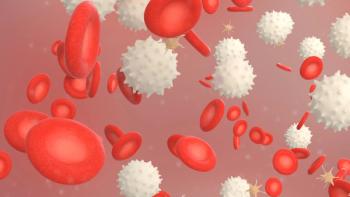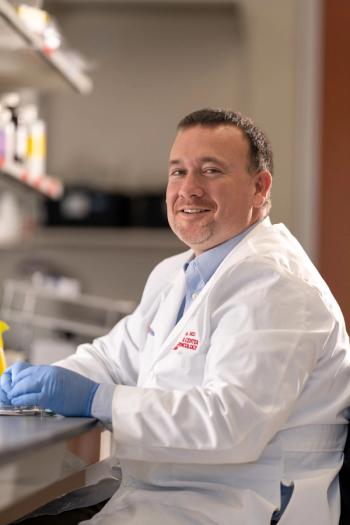
Last week, we saw FDA approvals for new drug regimens, as well as some expert opinion about cancer vaccines

A nationally-published, award-winning journalist, Alex Biese joined the CURE team as an assistant managing editor in April 2023. Prior to that, Alex's work was published in outlets including the Chicago Sun-Times, MTV.com, USA TODAY and the Press of Atlantic City. Alex is a member of NLGJA: The Association of LGBTQ+ Journalists, and also performs at the Jersey Shore with the acoustic jam band Somewhat Relative.

Last week, we saw FDA approvals for new drug regimens, as well as some expert opinion about cancer vaccines

A UCLA neurobiology professor and prostate cancer survivor discuss using artificial intelligence to map his disease and inform treatment decisions.

The Food and Drug Administration has approved Tagrisso plus platinum-based chemotherapy for patients with locally advanced or metastatic non-small cell lung cancer whose tumors have EGFR exon 19 deletions or exon 21 L858R mutations.

Treatment paradigms may soon be shifting in head and neck cancer, as recent research indicates that lower doses of chemoradiotherapy may be appropriate for some patients.

The Food and Drug Administration approved Tepmetko for adults with metastatic non-small cell lung cancer with MET exon 14 skipping alterations.

Moderna and Merck have initiated V940-001, a phase 3 study evaluating vaccine mRNA-4157 and anti-PD-1 therapy Keytruda as postsurgical treatment for stage 2B to 4 melanoma.

“Sleep apnea assessment must be a part of routine risk assessment for patients undergoing cancer therapeutics,” one researcher stated.

The Food and Drug Administration has approved Onivyde with oxaliplatin, fluorouracil and leucovorin, for the first-line treatment of patients with metastatic pancreatic adenocarcinoma, the agency has announced.

The Food and Drug Administration has granted a Fast Track designation to the novel immune activator drug BXCL701 in combination with a checkpoint inhibitor for patients with metastatic small cell neuroendocrine prostate cancer (SCNC).

Last week, we saw a few moving parts in the regulatory space, from new NCCN guidelines for pediatric neuroblastoma treatment to FDA Fast Tracks and Priority Reviews

From the San Francisco 49ers’ Trent Williams looking back on his cancer experience to a Republican congressman returning to work after myeloma treatment, here’s what’s happening in the oncology space this week.

Treatment with Opdivo (nivolumab) and chemotherapy did not significantly improve progression-free survival when compared with chemotherapy alone among some patients with EGFR-mutated metastatic non-small-cell lung cancer.

Treatment with Tagrisso after chemoradiation resulted in patients with EGFR-mutant stage 3 non-small cell lung cancer being nearly three times less likely to experience disease progression when compared with those treated with Imfinzi or subject to observation.

The development of immune-related side effects is associated with improved overall survival among patients with metastatic non-small cell lung cancer (NSCLC) who receive immune checkpoint inhibitor therapy.

“We have to make it known to people that we are not just a patient,” said Michelle Anderson-Benjamin, CEO of the Fearless Warrior Project, who received a diagnosis of metastatic breast cancer in 2022.

The FDA has granted Priority Review to oral ALK inhibitor Alecensa (alectinib) for patients with early-stage ALK-positive non-small cell lung cancer.

Country singer Toby Keith died Monday after receiving a stomach cancer diagnosis in 2022.

One cancer vaccine may still be years away from being available, a breast cancer test may be misguiding treatments for Black women and the review of two oncology regimens are being expedited by the FDA.

For patients with advanced non-small cell lung cancer and anorexia, the use of the antidepressant Remeron has been shown to increase energy consumption, as researchers look for therapies to answer an issue faced by many patients.

Results from the phase 3 INSPIRE study showed that treatment with Iruplinalkib reduced the risk of disease progression or death by 66% among patients with ALK-positive non-small cell lung cancer.

A vaccine for pancreatic and colorectal cancers is showing promise, but potential availability of the drug is likely several years away, an expert said.

“When you have support, you have answers to some of your unknowns and that can provide stability and ease in anxiety and depression, and truly propel you into thriving,” a cervical cancer survivor and advocate tells CURE®.

A multidose regimen of the novel human fusion protein with a treatment combination may result in prolonged survival after acute graft-versus-host-disease.

Here are some of the top stories from the recent Gastrointestinal Cancers Symposium as well as the Genitourinary Cancers Symposium.

Findings from the ASCERTAIN trial support the use of oral Inqovi for adults with intermediate- and high-risk myelodysplastic syndromes (MDS) such as chronic myelomonocytic leukemia (CMML).

CURE® editors discuss last week’s biggest cancer headlines, from Dexter Scott King’s death to the potential of laughter therapy to boost quality of life.

Patients with metastatic castration-resistant prostate cancer previously treated with external beam radiation therapy did not increase incidence of blood-related side effects with radium-223 compared with the overall population.

Researchers claim to have determined the maximum=tolerated dose and usage of hypofractionated concurrent chemoradiation with an adaptive stereotactic ablative radiotherapy boost for patients with locally advanced unresectable non-small cell lung cancer, according to recently published findings.

Dr. Dustin Deming, a gastrointestinal oncologist, began his own cancer journey more than a decade ago when he received a diagnosis of rectal cancer.
